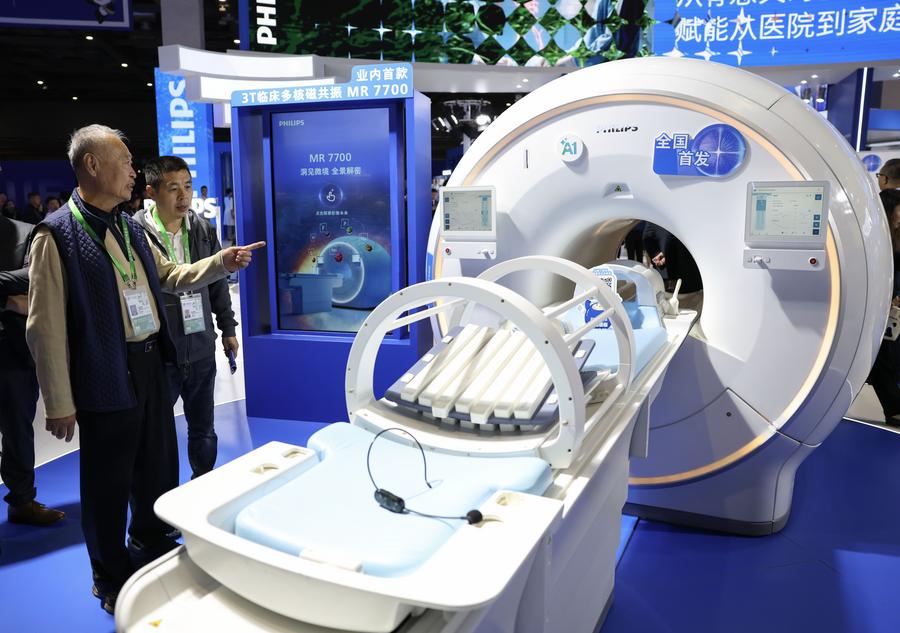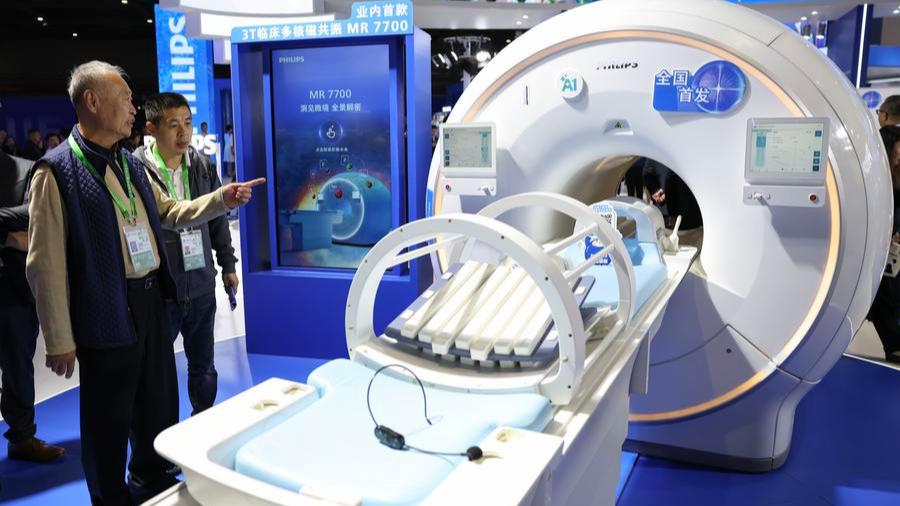
Visitors learn about the MR7700 multinuclear magnetic resonance scanner of Philips, which made its debut in China, during the 8th China International Import Expo (CIIE) in east China's Shanghai, Nov. 6, 2025. (Xinhua/Meng Chenguang)
SHANGHAI, Nov. 9 (Xinhua) -- Dutch health technology giant Philips is expanding its investment in AI-powered healthcare in China, unveiling its latest health solutions at the 8th China International Import Expo (CIIE) in Shanghai to tap into the country's rapidly evolving digital health landscape.
"AI is becoming a key force in addressing the common challenges of the medical system, and we have seen strong innovation momentum in China," Liu Ling, chief region leader of Philips Greater China, told Xinhua in an interview.
An eight-year participant of the CIIE, Philips is presenting about 50 innovations this year, covering precision diagnosis, intelligent imaging, and personal health. Highlights include its latest multi-nuclear MRI system offering radiation-free imaging, and AI-powered consumer products such as electric toothbrushes and shavers.
"China is not only one of the most dynamic markets for AI development, but also one with the most urgent demand and diverse application scenarios for medical AI," Liu said, noting that the country has developed more than 400 large AI models and over 100 licensed medical AI products.
The firm's AI solutions have been applied in smart magnetic resonance imaging, AI-assisted diagnosis in hospitals, as well as intelligent health management tools for consumers, according to Liu.
China's AI healthcare market has seen robust growth momentum in recent years, driven by advances in digital infrastructure and supportive government policies.
According to market research firm Frost & Sullivan, China's AI healthcare market is projected to surge from 8.8 billion yuan (about 1.2 billion U.S. dollars) in 2023 to 315.7 billion yuan by 2033, representing a compound annual growth rate of 43.1 percent.
Earlier this year, the country rolled out a nationwide "AI Plus" initiative, outlining measures to advance the AI application in areas such as assisted diagnosis and health management, thereby enhancing the capacity and efficiency of primary healthcare services.
Philips has collaborated with hospitals to apply its magnetic resonance acceleration technology, which triples scanning speed, reducing clinician workload while improving medical experience, Liu explained, stressing that "cross-disciplinary cooperation has helped boost the synergy of the medical ecosystem."
Liu also noted that healthcare innovation is moving toward greener and more efficient models. For instance, Philips Suzhou Innovation Center has fully developed and manufactured a 1.5-tesla MRI machine that operates without liquid helium, making it more energy-efficient and environmentally friendly. So far, more than 2,000 units have been installed worldwide.
Beyond serving the domestic market, these domestically developed solutions are exported to other global markets, Liu said. "For Philips, China is not only our second-largest market, but also an indispensable part of our global strategy."
"Truly meaningful innovation must be grounded in clinical practice and address local health needs," Liu said, adding that the firm has been deeply engaged in the Chinese market over the past 40 years.
"We remain confident in China's market," Liu said, adding that the company looks forward to working in tandem with local partners to "build an open, collaborative and forward-looking AI healthcare ecosystem," which helps create sustainable health value.




 A single purchase
A single purchase









